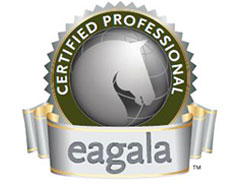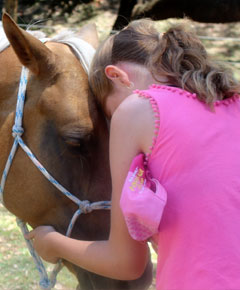
Research Highlights
EAGALA is committed to empirical research as an important tool in identifying best practices. Studies consistently found statistically positive change on clinical outcome measures as a result of EAP and EAL. Below are some of the many studies conducted to date;
In a 12 week comparative study of 205 ‘at-risk’ students (Grade 3-8)
- Students were considered ‘at-risk’ if they had serious behavioural issues, learning difficulties, or social adjustment concerns.
- Pre- and post- measures were taken using both the BASC Self Rating Parent Rating scales.
- A Psychosocial Session Form was also completed at the end of each session.
- Participants in EAP made statistically significant improvements in 17 areas.
- Participants in the empirically supported award-winning school based counselling program made statistically significant improvement in 5 areas.
At Risk Youth/Children – Trotter, K., Chandler, C., Goodwin-Bond, D., & Casey, J. (2008). A comparative study of the efficacy of group equine assisted counseling with at-risk children and adolescents. Journal of Creativity in Mental Health, Vol. 3(3), 254-284.
Intra-family Violence
- EAP was used with 63 children who had been witness to family violence situations.
- Participants had been diagnosed with disorders such as ADHD, mood disturbances (including depression), PTSD and adjustment disorder.
- The study tested the efficacy of EAP over approximately 19 sessions.
- All 63 children showed significant improvement in their Global Assessment of Functioning (GAF) scores from pre- to post intervention.
- Children in the group who had a history of physical abuse and neglect in addition to experiencing intra-family violence had a statistically significant greater percentage improvement in GAF scores after treatment.
Children/Intra-family violence – Schultz, P., Remick-Barlow, G.A., Robbins, L. (2006). Equine-assisted psychotherapy: a mental health promotion/intervention modality for children who have experienced intra-family violence. Health and Social Care in the Community (2007) 15(3), 265-271.
Review of EAP Study
- A clinically significant increase of 82% improvement in mood conduct and psychotic disorder was found in adolescents participating in equine-assisted family therapy.
- Youth offender’s repetition of offences were reduced after equine-assisted therapy.
- Children with ADD have been reported to focus for longer periods of time when leading or grooming horses.
- Confidence and self-esteem increased through successful completion of the horse-oriented task.
Review of EAP – Frewin, K. & Gardiner, B. (2005). “New age or old sage? A review of Equine Assisted Psychotherapy.” The Australian Journal of Counselling Psychology, 6, pp13-17.
Social Competence
- A randomized controlled trial was conducted to determine if an 11 week EAL program enhanced children’s social competence (Grade 5-8). 64 children were randomly assigned to either an experimental group or a control group.
- Pre- and post- measures were taken by parents of both groups. The experimental group participated in once-weekly, 90-minute EAL sessions of individual, team, and group-focused equine facilitated activities.
- The EAL had significant positive effects in terms of various aspects of social competence, including improvements in self-awareness, self-management, personal responsibility, decision making, goal directed behaviour, and relationship skills.
Pendry, P., & Roeter, S. 2013. Experimental Trial Demonstrates Positive Effects of Equine Facilitated Learning on Child Social Competence. Human-Animal Interaction Bulletin, 1(1): 1-19.
Cortisol Levels / Trauma
- In a randomised trial, children had significantly lower basal cortisol (stress hormone) measures after 11 weeks of engaging with horses than those on the waitlist group (Lower basal cortisol levels constitute a protective influence against the development of psychopathology and health problems).
- A program evaluation study found the EAGALA Model is an effective approach when working to alleviate trauma symptoms for children and adolescents who had been sexually abused, resulting in a significant reduction in undesirable behaviours and symptoms of depression and anxiety.
Cortisol level and mental health – Pendry, P. (Ph. D.), Smith, A., and Roeter, S. (2014). Randomized trial examines effects of equine facilitated learning on adolescents’ basal cortisol levels. Human-Animal Interaction Bulletin 2014, Vol. 2, No 1, 80-95.
Trauma – Kemp, K. et.al (2013). “Equine Facilitated Therapy with children and adolescents who have been sexually abused: A program evaluation study.” Journal of Child and Family Studies.
PTSD / Violent Behaviour
- An evaluation on Veterans participating in an EAGALA program revealed a 72% reduction in symptoms of PTSD. The program further revealed 50% of veterans with PTSD experienced reduction in symptoms that were clinically significant.
- A clinical study revealed EAP reduced violent behaviour in chronic psychiatric inpatients and had significant improvement compared to the canine therapy group and the psychoeducation group.
- A reduction in violent behaviour continued to be sustained for several months after treatment and concluded EAP may be an effective therapeutic modality for long-term psychiatric patients at risk of violence.
Veterans with PTSD – PEACE Ranch, Equine Assisted Veterans Services (EAVS) December 2013 Report, www.eagala.org.
Violence – Nurenberg, J.R. et.al (2014). “Animal-Assisted Therapy With Chronic Psychiatric Inpatients: Equine-Assisted Psychotherapy and Aggressive Behavior.” Psychiatric Services in Advance, Oct. 1, 2014.

At HORSEACCORD we use the EAGALA Model of Equine Assisted Psychotherapy and Personal Development


“There is something about the outside of a horse that is good for the inside of a man.”
Winston Churchill
